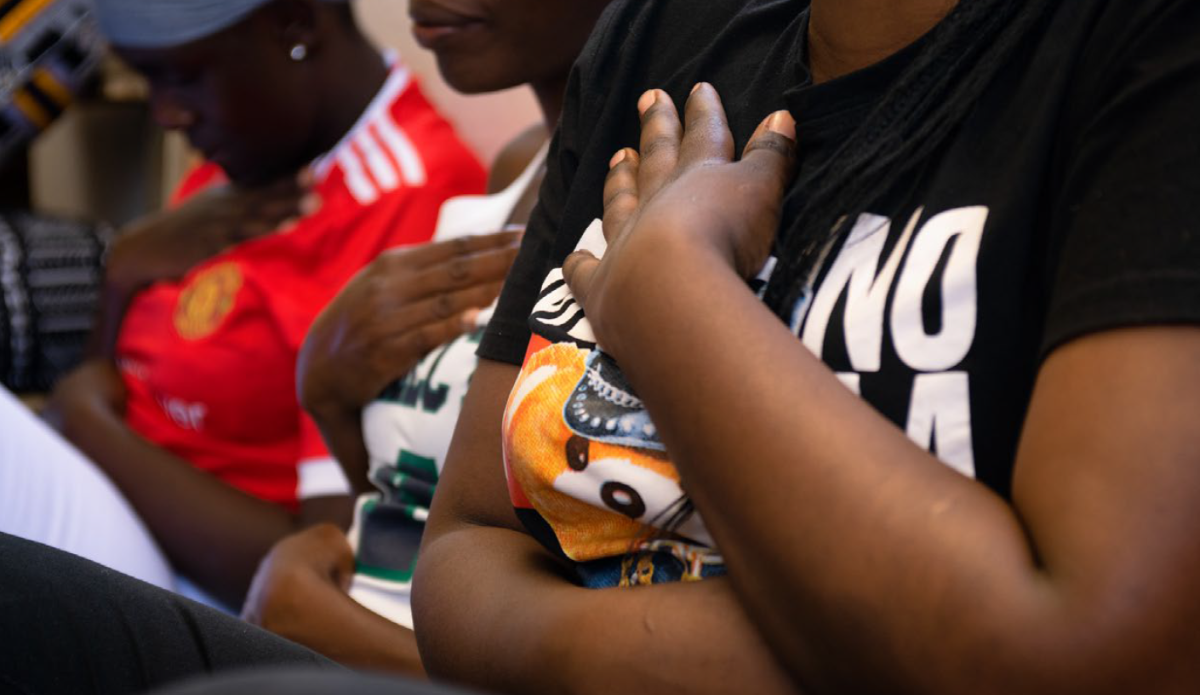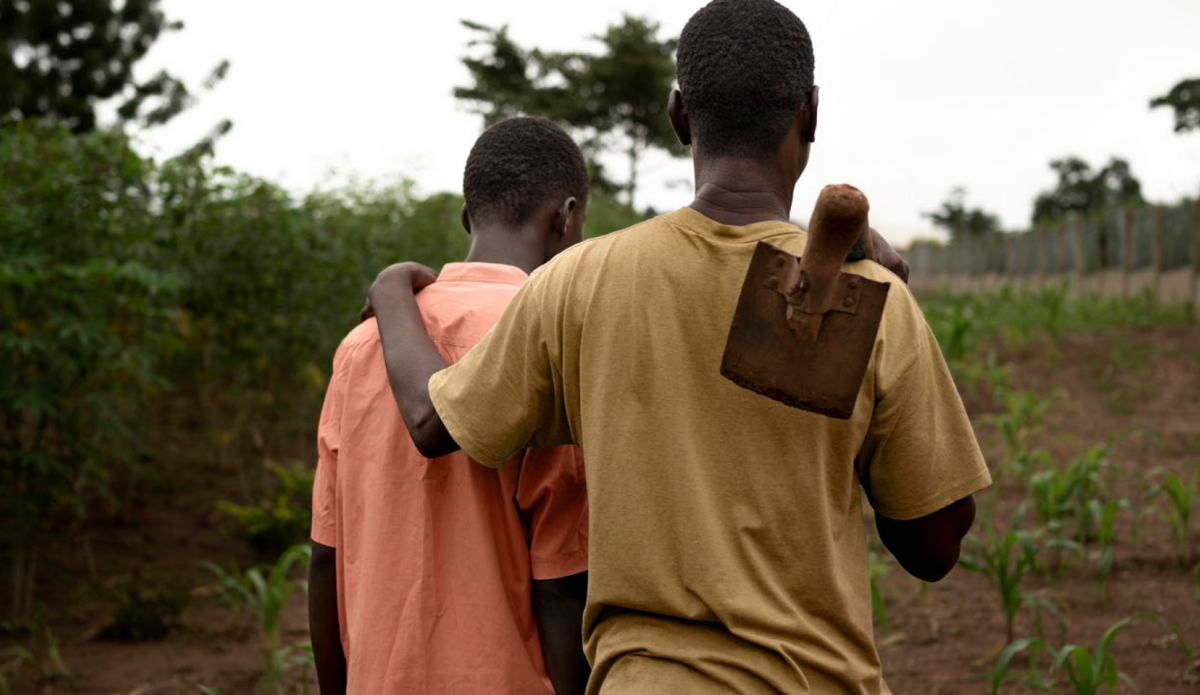This research summary encompasses six research projects carried out in 2023 as part of the ‘Towards Principles for Equitable Engagement’ network, led by the University of Liverpool in collaboration with an international group of experts. They include:
- Aké Achi (Migrants at Work)
- Ling Li (Independent Consultant)
- Benedetta Wasonga (Director Gender, Justice and Human Rights at the Centre for Equality Diversity and Inclusion (CEDI))
- Chris Ash (Survivor Leadership Program Manager, Coalition to Abolish Slavery and Trafficking)
- Dr Sutirtha Sahariah (Independent Consultant)
- The Azadi Kenya team.
Together the projects offer a rich mix of distinctive perspectives on how ethical and equitable involvement of lived experience can improve policy and practice in efforts to address modern slavery and human trafficking. The research findings deepen understanding of the transformative potential of lived experience engagement and speak to the three key principles on the importance of being non-tokenistic, trauma-informed and preventing harm, identified in the earlier, ‘Promising Practices in the engagement of people with lived experience to address modern slavery and human trafficking' report, produced by the same network in 2022.
The process of carrying out this work together as a network generated a further set of insights around knowledge production and its potential to achieve structural change in the way that these issues are addressed by policy and practice. Key to this is co-production: enabling the development of an inclusive programme of research that aligns with the needs and interests of those with lived experience; flexibility in methods needed for equitable and ethical research that focuses on engagement and partnership; the need to embrace authenticity and diversity in co-development, avoiding the impulse to impose a unifying theme; and about the implications of this work for calls to build a global research agenda. These reflections on co-production are further explored in the output accompanying the project reports: ‘Knowledge for change: lessons from co-developing a research agenda on survivor engagement’.
Lessons and insights for policy and practice
The evidence from the six projects is fully presented and explained within each report including sections on background to the research, methods and recommendations for specific actors and groups. We would like to highlight three overarching areas where we believe that there are important general lessons for policymakers and practitioners:
1. Organisations led by survivors and dedicated to serving their needs are actively establishing principles for equitable engagement and offer valuable evidence and insights to guide ethical and effective engagement with lived experience for policy and practice.
- The study by Azadi Kenya demonstrates how organisational policies designed to protect and safeguard can be co-produced with those they are seeking to benefit. The study by Sutirtha Sahariah examines how community-based organisations produce the conditions which enable effective engagement in India.
2. The dynamic and evolving nature of exploitation is such that those with direct experience are best placed to explain and guide responses, including about how current policies and regulations open and close opportunities for exploitation.
- Ake Achi’s research on ‘homegrown slavery’ in the UK and Ling Li’s research on ‘online scamming’ both demonstrate how responses to these phenomena need to be informed by, and led by, those with lived experience if they are to be effective.
3. A focus on lived experience engagement brings to the fore the importance of voice, language and terminology and unlocks possibilities to confront wider power relations.
- Chris Ash’s research develops a deep analysis of storytelling as standard practice in incorporating survivor voices in North America, while Benedetta Wasonga’s study speaks to the neo-colonial overtones of the anti-trafficking discourse in Africa.
Together all six studies reveal pathways to better and more effective engagement with lived experience, by:
- mapping the methods which help sustain and develop non-tokenistic forms of engagement and involvement, towards survivor leadership;
- pointing to the ways in which survivor leadership, sometimes in collaboration (but also in competition) with other civil society organisations, can overcome the shortcomings of existing policy frameworks;
- highlighting how current anti-trafficking policy and practice carries risks because of the lack of meaningful engagement with lived experience, why this can lead to ineffective responses, problematic forms of communication and issues such as tokenism.
This set of research projects points forward in multiple directions: to the ways in which engagement, empowerment, and more ethical approaches lead to benefits for individual and community well-being; to the ways that lived experience can provide the means to push for structural change in how policy and practice develops; and how this links to appropriate methods for collaboration and co-production of future research.
Project summaries
Conveying safety: how to promote safeguarding in anti-modern slavery work
Author: Azadi Kenya

This study explored safeguarding protocols and contextualisation issues in Kenya. It involved a collaboration with people with lived experience (survivors) via two focus groups to identify and discuss safeguarding elements, complemented by interviews with four safeguarding professionals in Kenya. Based on the insights from these methods, the team developed several outputs: a project report, a safeguarding toolkit, and a reflective note on their collaborative research.
The key findings were that an inclusive approach combining empathy and caution can prioritise survivor autonomy and involve them as collaborators, not just subjects. Developing organisational safeguarding policies and a sensitive culture can create a secure environment for engaging meaningfully, in terms of sharing experiences, insights and expertise. Clear communication about boundaries, consent, confidentiality, and available support establishes trust. Tailored resources and trauma-informed strategies ensure emotional well-being. Regular check-ins and exit strategies further safeguard people with lived experience in engagements. Vigilance against re-traumatisation must guide every step and practice of safeguarding. The focus on safeguarding was found to be of great value: by fostering a culture of safety, antislavery work can genuinely empower survivors, offering a platform for their voices and agency while upholding their dignity and emotional welfare.
Survivor engagement, prevention, and advocacy: a case study from the front-line source area in India
Author: Sutirtha Sahariah

This study investigated the complex realm of survivor engagement through a case study approach, looking at a community-based organisation (CBO) in India. The research examined the organisation’s strategies, mechanisms, and outcomes concerning survivor engagement, and how this fitted within its overall structure, leadership, and programmatic goals. The research involved interviews with diverse members of the organisation, observation methods and focus group discussions including survivor leaders affiliated with the organisation. The research was able to gather and analyse the authentic voices, experiences, and insights of survivor leadership, providing insights into the dynamics of survivor engagement.
Overall, the study shows that there are real, measurable benefits to engaging survivors in local initiatives, such as increased awareness, improved advocacy, and more effective programmes or initiatives. However, the study found that engaging survivors in various activities or initiatives is not a simple process but rather a complex and multifaceted one, as the process involves many dimensions and considerations, including social, economic, and political aspects. The findings highlight how survivor engagement has ripple effects that are likely to impact not only the organisations directly involved but also other local organisations, communities, and other stakeholders. More importantly, the findings provide insight into the fundamental principles that guide survivor engagement, including valuing, mainstreaming, and ensuring sustainability.
The study emphasises the importance of valuing and compensating survivors appropriately for their time and expertise when they participate in programmes and initiatives. This includes compensating them for their contributions as they work towards establishing sustainable livelihoods for themselves. Asking survivors to pay out of their own pockets to facilitate their engagement puts them at risk of harm and re-exploitation.
It’s common for survivors to be involved in program delivery/implementation but not consulted or engaged in the designing and evaluation phases, leaving the engagement incomplete. The study findings highlight the significance of involving survivors throughout the entire process of design, delivery/implementation, and evaluation of programming. This approach has enormous potential and value for mainstreaming engagement.
Forced to scam: pitfalls and challenges of survivor engagement in Southeast Asia’s new fraud economy
Author: Ling Li

This study provides an important case study of practice and potential for survivor engagement on online scamming, a form of exploitation that is gaining significant interest at the multilateral/international level. The research explored how civil society is engaging with survivors of scamming compounds in Southeast Asia and how this can help address the plight of victims of this new form of modern slavery. The research included interviews with eight professionals from different sectors that focus on addressing online scamming, including three survivor leaders.
The results highlight the considerable challenges civil society organisations (CSOs) face to engage with survivors of human trafficking within the online scam industry. The pressure is mounting because survivors’ stories are gaining visibility, and there are demands on governments to recognise them as victims of modern slavery, requiring effective victim identification systems.
The study found that it is crucial for CSOs to prioritise survivors’ safety, housing, and recovery before involving them in activities addressing human trafficking. This approach acknowledges the importance of supporting survivors in their recovery journey before expecting them to meaningfully participate in antitrafficking initiatives. Efforts to develop survivor leadership could include training programmes to formalise expertise and build confidence. For survivor engagement to be successful, CSOs need frameworks that incentivise participation, and more collaborative relationships between the authorities, CSOs, and survivors. Survivor engagement will be pivotal for developing a comprehensive approach to addressing this new and rapidly expanding phenomenon.
Homegrown slavery: ending state-sponsored trafficking. An ‘ethiquitable’ engagement approach.
Author: Aké Achi

This study explains the phenomenon of ‘homegrown slavery’ and how existing frameworks and responses are insufficient to address it. It defines ‘homegrown slavery’ as a legal system sanctioned by the UK government perpetuating a form of state-sponsored trafficking, not in the sense of state authorities forcing citizens to work, but in its legal frameworks facilitating bringing people into the condition of slavery or forced labour. The report focuses on the practice of granting by the UK Home Office visa sponsorship licences to respectable UK employers who recruit and transport overseas workers into the UK labour market, where many find themselves vulnerable to extreme exploitation, rights violations, and lack of autonomy. This form of slavery shares striking similarities with historic forms of slavery.
The study redefines Trafficking in Persons as ‘Trafficking in Person in Work (TIPIW)’, re-imagining the three constituent elements of the international definition of ‘Trafficking in Person’ into four, namely the ‘process,’ the ‘servile status,’ the ‘exploitation’, and the ‘condition.’
The research delves into the perspectives and insights of people and organisations led by lived experience (SOLEX – Self-Organised Lived Experience), highlighting the gaps between implementation of legal provisions and real-world experiences of migrant workers in the UK.
The results capture the nuanced narratives and perspectives of individuals with lived experiences and show how their insights help re-imagine the legal framework, what is effective, and where the obstacles are to a more sustainable approach. The research finds that SOLEX organisations and advocates face exclusion and exploitation within the anti-trafficking sector. Recommendations are addressed to diverse stakeholders, advocating survivor inclusion, regulatory reforms, and human rights principles to transform anti-trafficking efforts. By leveraging survivor expertise, the report emphasises the potential to revolutionise how homegrown slavery is combatted to drive lasting change. The methodology was multifaceted, including an in-depth desk review of the existing legal instruments, semi-structured interviews with six professionals and focus groups, and analysis of case records.
Whose story, whose benefit? Returning (to) the power of authentic narrative
Author: Chris Ash

This study explores how ethical storytelling models can empower individuals with lived experience. The project seeks to harness personal narratives for empowerment, community well-being, and structural change. It employed a methodology involving a review of different models for ethical storytelling alongside semi-structured interviews with five professionals.
The findings reveal the significance of storytelling in shaping social change, advocacy, learning, connection, and community care. The antitrafficking sector has often relied on survivor stories to influence policies, programs, and public perception. However, this study identifies potential harm caused by existing approaches. Engaging existing ethical frameworks and professional interviews, the study suggests promising practices for survivor-driven storytelling.
Existing models emphasise trauma-informed, culturally responsive narratives, prioritising marginalised experiences and fostering wellness. Yet, lacking practical guidance, these concepts often lack meaningful implementation. Interviews in this study confirm misalignment between expected content, survivors’ preferences, and effective communication methods. Stakeholders are urged to mitigate external power dynamics shaping narratives.
Recommendations include opt-in storyteller selection, survivor collective mentorship, authentic storytelling skill-building, and economic support. Survivors should not be coerced into sharing their stories solely due to financial pressure. To avoid this, they should receive economic support, including financial assistance, job opportunities, or other means to reduce their financial dependency on sharing their traumatic experiences. The study underscores the importance of empowering survivors, ensuring their stories are authentically represented, and fostering meaningful change through ethical storytelling practices.
Unveiling consistency in the use of standard terminologies: a study of international anti-slavery policy and programming in Africa
Author: Benedetta Wasonga

This study explores the current usage of standardised terminologies, concepts, and definitions in addressing modern slavery in Africa, as per the Sustainable Development Goal (SDG) 8.7. Through stakeholder consultations, including key informant interviews and a focus group with six professionals, the study examined the impact of these terminologies on survivor involvement and the effectiveness of policies and programs related to SDG 8.7.
The findings urge policymakers, NGOs, donor funders, and international bodies to re-evaluate and potentially adopt new terminologies in collaboration with affected communities and people with lived experiences. The study found that “modern slavery” is often used symbolically, creating ambiguity. While some terms like human trafficking, slavery, and forced labour are legally defined, “modern slavery” is not codified in international law.
Inadequate, non-standardised terminologies hinder efforts to address exploitation, necessitating harmonising definitions for effective national and regional cooperation. The findings emphasise the importance of integrating people with lived experiences and insights in defining and unpacking what are often seen as universal terms and concepts. Definitions, and the policies and decisions that flow from them, should be evidence-based and survivor-informed, meaning survivor engagement throughout policy and program stages. The study advocates for a comprehensive, survivor-centred approach to develop effective responses, leading to meaningful change at all levels of intervention.



